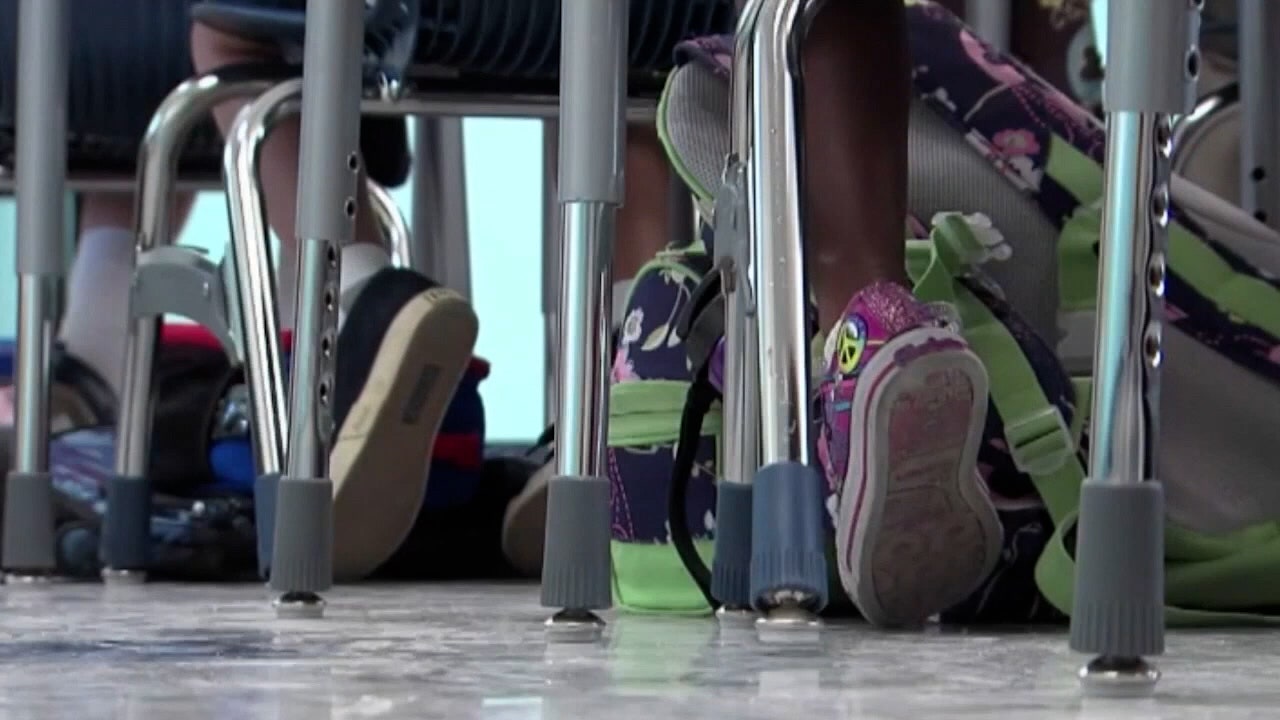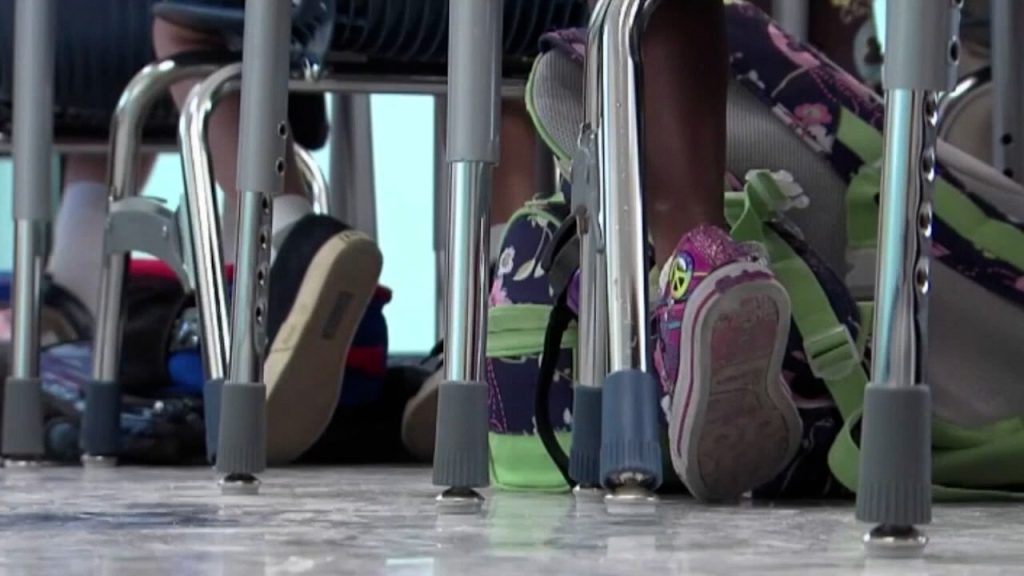
Teachers train on issues of mental health
Given the high and sometimes deadly stakes of students having mental health breakdowns, the district mandates the training for all 25,000 employees.
TAMPA, Fla. – With the first day of school set for Wednesday in most districts, child health experts say heading back to the classroom can trigger an upswing in anxiety in a lot of kids.
When you consider the potential stressors, it’s not hard to see why, especially for the youngest students. Separating from parents, managing peer groups, and meeting academic expectations are all factors, writes Julia Martin Burch, PhD for Harvard Health Publishing. That’s not to mention navigating loud, crowded hallways and cafeterias.
This is why it’s normal for kids to experience some anxiety leading up to the new school year, Dr. Martin Burch says, and for parents to notice a rise in worries.
For example, your child might ask questions about what their new classroom or teacher will be like. Maybe they’re nervous about riding the bus. They might worry about having all of their school supplies ready or experience some trouble falling asleep in the days leading up to the start of school.
READ: Hillsborough teachers, staff trained in mental health awareness ahead of new school year
But for some kids, especially ones who already struggle with anxiety, Dr. Martin Burch writes, there’s an elevated level of stress that you might see signaled by their behavior.
Examples of behaviors that suggest your child is experiencing above-average anxiety around the return to school include:
- Continually seeking reassurance or asking repeated, worried questions despite already receiving an answer. “What if my friends are not in my class? When will I see them? What if I don’t have anyone to sit with at lunch because I have no friends? Will I be okay?”
- Increased physical complaints, such as headaches, stomachaches, and fatigue in the absence of an actual illness.
- A significant change in sleep pattern, such as taking an hour to fall asleep when a child normally goes to sleep quickly or waking you up with worries during the night when a child typically sleeps well.
- Avoiding school-related activities, such as school tours, teacher meet-and-greets, or avoiding school itself once the year starts
Dr. Wendy Rice is a Tampa-based licensed psychologist and founder of Rice Psychology Group. When asked specifically about how to prepare anxious elementary students for the return to school, this is the message she has for parents to share with their kids:
“If kids say something mean to you, or today you get left out, or if you raise your hand, and you answer a question incorrectly, it’s okay,” she tells parents to say to their kids. “You’re growing up, experimenting, you’re trying. You don’t know all the answers, and you’re not an ‘expert friend’ and neither are the kids you’re trying to be friends with!”
The number one thing, she says, is for parents to express compassion for their kids if they’re struggling through the academic and social demands that come with the end of summer and the start of school. What’s more, she says it’s critical for parents to teach kids how to have compassion for themselves.
At Harvard, Dr. Martin Burch offers the following advice on how parents can help with back-to-school anxiety:
- Approach anxiety instead of avoiding it. It’s natural to want to allow your child to avoid situations that make her anxious or reassure her that her worries won’t come true. However, this can actually contribute to a vicious cycle that reinforces anxiety in the long term. Instead, acknowledge your child’s emotion and then help her think through small steps she might take to approach, rather than avoid, her worries. For example, you might say, “It sounds like you’re feeling anxious about riding the school bus by yourself. Would you be up for checking out the bus stop with me this afternoon?” Give lots of attention and praise to any “brave” behaviors rather than to her anxiety. “I love how willing you were to take the bus this morning! Great job pushing back on the worry bully!”
- Practice school routines. For example, before the start of the year, you and your child might do a school day walk-through of the morning routine: waking up, eating breakfast, packing his school bag, and traveling to school. School tours or meet-and-greet days can be great opportunities to practice navigating the school environment and tolerating any anxiety in a low-stakes situation. After practice runs, debrief with your child on successes and challenges. Support your child in problem-solving around difficult points. For example, if he worries that he will have trouble finding his new classrooms, help him think through who he could ask for assistance if that occurs.
- Model behavior you’d like to see. When an anxious child refuses to get onto the school bus or has a tantrum about attending school, it’s natural to feel frustrated, harried, and anxious yourself. However, try to model the calm behavior you would like to see in your child. Take deep breaths from your belly. Remind yourself that your child’s behavior is being driven by anxiety.
- If necessary, step away from the situation to take a few minutes to breathe and engage in a mindfulness strategy, such as counting all of the objects of a certain color or shape in the room around you.
- Ensure enough sleep. The shift from a summer wake-up schedule to the school year wake-up time can be very challenging for many children, particularly preteens. Fatigue and crankiness from not getting enough sleep can make children much more vulnerable to anxiety. To combat this, consider moving your child’s wake-up time earlier and earlier in short increments in the weeks leading up to the start of school. Additionally, leave screens (TV, phone, computer) outside the bedroom at night.
- At the middle school level, Dr. Rice says parents should be taking the following approach with students, especially if they’re anxious about heading back to school.
“You sort of say, ‘Hey, what went well today?’ or ‘What was rough today?’ And then let the kids talk. Control your face. Try not to put on a judgmental face and just say, ‘Ok.’ And if you’re bursting because you need to make a suggestion, and you can’t contain yourself any longer, you can say to them, ‘Hey, thanks for telling me. Did you want me to just listen today?’ Or, ‘Do you want me to share some thoughts with you?'”
She went on to explain that if your kid says they really just want you to listen today, parents should do everything that can to respect such requests, even if you are bursting. “Because then, your kid is going to come talk to you again,” Dr. Rice said.
High school students are not immune to back-to-school anxiety, even if they might try to play it off. By now, students are thinking about test scores and college admissions. They’re balancing academics with athletics and other activities. They may be managing more complex relationships with peers and facing increased social stressors.
Dr. Rice said that at this age, teenagers do still need their parents as ‘cheerleaders’- a support system, but that they don’t want their parents to solve their problems for them.
“They need to be able to talk things through,” she said. She also underlined one of the biggest stress factors for students at this particular stage: the pressure to decide early on what their plans are after graduation.
“If you have a child who knows what they want to be, terrific,” Dr. Rice tells parents. “And if you don’t, let them know that they are kids, and this is a time for developing their identity, and trying different things on. Allow them that freedom and be the voice that is different from what schools are telling them, because some schools, the teachers and the guidance counselors are towing the party line.”
Dr Rice went on to point out that there are alternatives to a four-year degree after graduating high school, including technical college, gap years, internships, and service projects. She said the pressure of post-grad planning has increased dramatically over the years, and that it’s OK if your student chooses to take a different route.
“Show support; give your student time to think about what’s next,” she says, and above all, don’t add to the pressure they’re likely feeling already.
Some parents may wonder when to seek additional help for a child’s worries about heading back to class. Dr. Martin Burch writes that if such concerns start to interfere with his or her ability and willingness to attend a school or participate in other normal activities, such as camp, beloved sports, or play dates, consider consulting with a licensed mental health professional who specializes in child anxiety.

